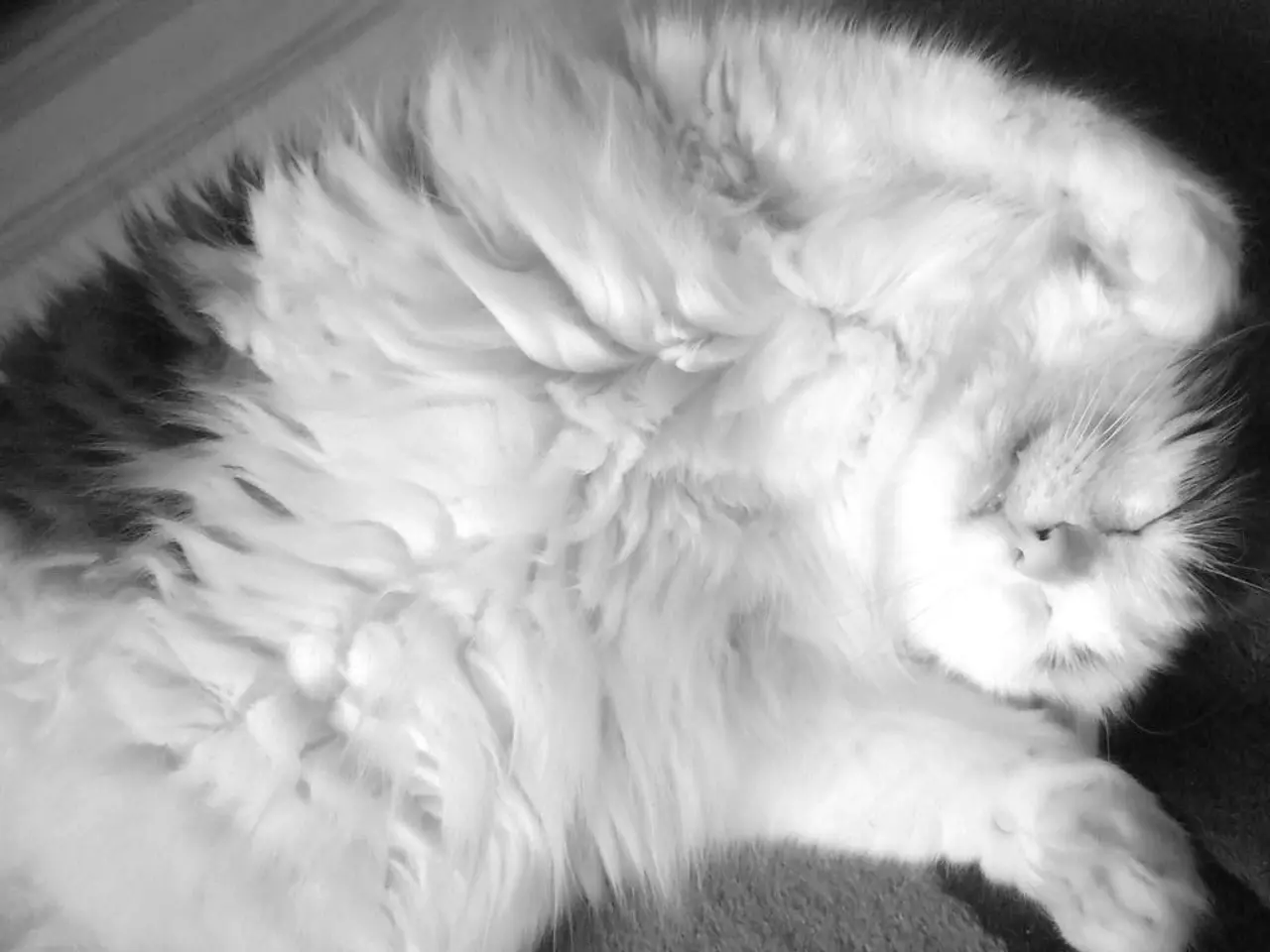Sudden Body Movements During Sleep Onset: The Reason Behind Pre-Sleep Twitches
Hypnic jerks, also known as sleep starts, are common and harmless involuntary muscle twitches that occur as a person falls asleep. Recent research using EEG suggests that specific brain activity, known as vertex sharp waves, may be associated with these jerks [1].
While the exact cause of hypnic jerks remains unclear, several factors are believed to contribute to their occurrence. These include stress and anxiety, stimulant use, sleep deprivation, certain medications, and intense physical exertion [2][3][5].
Fortunately, there are steps you can take to reduce the frequency of hypnic jerks. By making some lifestyle changes, you can improve your overall sleep quality and reduce triggers associated with muscle twitching as you fall asleep.
Firstly, maintain a regular sleep schedule. Aim for about 8 hours of sleep each night and try to go to bed and wake up at the same time daily, including weekends. This consistency can help regulate your body's internal clock and improve sleep quality [1].
Secondly, create a relaxing bedtime routine. Avoid electronics at least 30 minutes before bed and engage in calming activities like reading or puzzles. This digital detox can help your mind unwind and prepare for sleep [1].
Thirdly, optimize your sleep environment. Keep your bedroom quiet, cool, and dark to promote restful sleep. A comfortable and conducive environment can make it easier to fall asleep and stay asleep [1].
Fourthly, limit your intake of stimulants. Reduce or avoid caffeine and nicotine, especially in the hours before bedtime. These substances can interfere with sleep patterns and trigger hypnic jerks [1].
Fifthly, manage your stress levels. Incorporate stress reduction techniques such as mindfulness, tactical breathing, or other relaxation methods to lower anxiety levels. High stress and anxiety levels can increase the risk of hypnic jerks [2].
Lastly, watch your diet. Have smaller meals before bed and avoid alcohol, which may disrupt sleep patterns [1].
If hypnic jerks persist or worsen, consulting a healthcare professional is advisable to rule out underlying conditions or medication side effects. It's important to note that experiencing hypnic jerks does not mean that you have an underlying medical condition [6].
In some cases, healthcare professionals can prescribe medications to help people get more restful sleep [6]. However, it's crucial to remember that hypnic jerks are not dangerous and do not require medical treatment unless they cause distress or other symptoms such as incontinence, injury, pain, or confusion [6].
Hypnic jerks can occur in people of all ages, including children and babies. While they may be more noticeable in adults, they can occur from birth in children [4].
In conclusion, by making these lifestyle changes, you can help minimize the occurrence of hypnic jerks and improve the quality of your sleep. A good night's rest is essential for overall health and wellbeing, so it's worth taking the time to create a sleep-friendly environment and reduce triggers that may contribute to hypnic jerks.
References: [1] American Sleep Association. (2021). What are Hypnic Jerks? Retrieved from https://www.sleepassociation.org/sleep-education/sleep-disorders-library/what-are-hypnic-jerks/ [2] National Sleep Foundation. (2020). Hypnic Jerks: What They Are and How to Manage Them. Retrieved from https://www.sleepfoundation.org/articles/hypnic-jerks-what-they-are-and-how-to-manage-them [3] Mayo Clinic. (2021). Hypnic jerks: Causes, symptoms, and treatment. Retrieved from https://www.mayoclinic.org/diseases-conditions/hypnic-jerks/symptoms-causes/syc-20352566 [4] Cleveland Clinic. (2021). Hypnic jerks: What are they and what can you do about them? Retrieved from https://my.clevelandclinic.org/health/diseases/18071-hypnic-jerks [5] Harvard Health Publishing. (2020). Hypnic jerks: What are they and what causes them? Retrieved from https://www.health.harvard.edu/staying-healthy/hypnic-jerks-what-are-they-and-what-causes-them [6] Healthline. (2021). Hypnic Jerks: Symptoms, Causes, and Treatments. Retrieved from https://www.healthline.com/health/hypnic-jerks
- Maintaining good mental health is crucial, as high stress and anxiety levels can increase the risk of experiencing hypnic jerks.
- Atopic dermatitis and type 2 diabetes are not associated with hypnic jerks, but managing these conditions can contribute to overall health and sleep quality.
- While the exact cause of hypnic jerks is still unknown, recent predictive studies using EEG suggest a connection between specific brain activity and these involuntary muscle twitches during sleep.
- If you have multiple sclerosis, Alzheimer's disease, or depression, it is essential to consult with a healthcare professional regarding any changes in symptoms, including the occurrence or worsening of hypnic jerks.
- As part of your health-and-wellness routine, optimizing your sleep environment by keeping it quiet, cool, and dark can help promote better sleep quality and reduce the occurrence of hypnic jerks.
- Avoiding stimulants like caffeine and nicotine in the hours leading up to bedtime can help reduce instances of hypnic jerks, as well as improve overall sleep patterns.
- Hypnic jerks can occur in people of all ages, including children and infants, and while they are generally harmless, consulting a healthcare professional can rule out underlying health conditions or medication side effects as potential causes.




